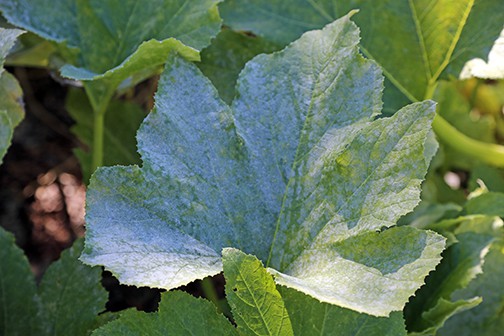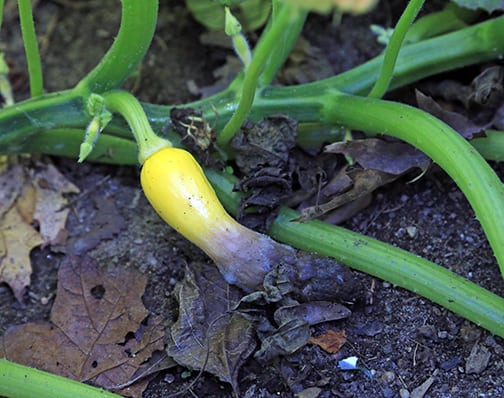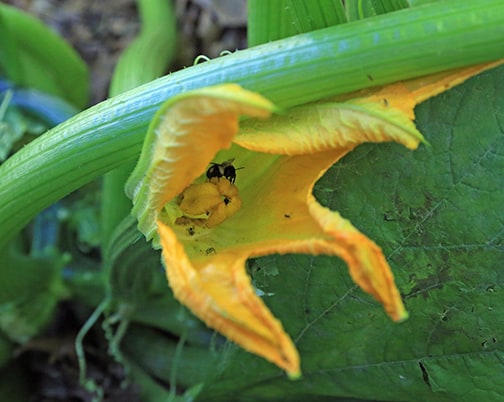When summer squash does well the gardener is usually overrun. We look for recipes that use lots of zucchini or patty-pans and give them away to friends, coworkers and the teller at the bank’s drive-up window. But all the summer and winter squashes are prone to particular problems. Here are some of the most common reasons that squash plants die.
- Mildew: this is a fungal disease that causes the leaves to turn grayish. Mildew weakens the plant and causes it to die prematurely. If you have had mildew in the past you’ll want to start spraying early in the season, before the plant gets a problem, in the future. I’ve used Actinovate, Green Cure, and Copper fungicides successfully. Although the plants eventually still get mildew weekly spraying suppresses the fungi and allows a full season of harvest. I’ve also found that Zephyr summer squash are particularly good about continuing to produce even when the plant has mildew.
- Squash Vine Borer: if your zucchini suddenly wilts and you know that it isn’t dry, you’ve probably got a borer in the stem. Lift the stem and look for the hole where the larva entered. Slit the stem moving toward the end of the vine until you find the culprit, remove and smash it. Bury the vine where it has been slit and water the area to promote rooting
- We’ve had good success avoiding borers by dusting the area around our plants and the stems with wood ash. We save a metal can of ash from the winter and put a layer around the plants when they are small. Then as the plants grow we dust the tops of the vines with ash weekly. This seems to deter the moth that lays eggs that hatch into vine borers. You have to keep up the ash applications through August…let me know if it works for you.
- Read more about squash vine borers here.
- Rotting squash: if the developing squash are in contact with damp ground they can get various forms of rot. This is especially prevalent in humid weather or after periods of frequent rain. Provide a layer of straw or pine needles for the developing squash to rest on and spray the vines with Actinovate.
- No developing squash: occasionally people have a squash plant that flowers but doesn’t produce squash. If this is happening to you early in the season, wait a couple of weeks and see if the situation resolves naturally; squash plants often produce male flowers first but later go on to make females too. If you see male and female flowers on the plant but fruit isn’t developing, pollination is probably the problem. You can hand pollinate the flowers using a soft paintbrush, doing this in the morning shortly after the flowers have opened. In the future plants an assortment of flowering plants that draw pollinators around your garden. Calamintha, Zinnias, roses and most herbs are good for attracting bees and other pollinators to your vegetable bed.

Mildew looks like a light grey powder. Be sure to spray your organic fungicide under the leaves and on the stems as well as on the top of the foliage.

Because the foliage on squash plants is so large and thick the ground underneath can stay damp which can lead to rot. Be sure not to water daily: a deep soaking less often is better than a little every day. Providing a layer of pine needles or hay underneath developing squash helps as well.

Bees aren't the only insects that pollinate squash and other plants. Wasps, flies and other flying insects do the job as well. Be sure to plant a wide variety of plants around your property to attract the widest selection of pollinators, and don't use insecticides that will kill them off.
Given the problems that summer squash are prone to, is it worth planting them in the home vegetable garden? Absolutely. Even as we deal with mildew and other situations that arise we are harvesting twelve Zephyr squash per day off of six plants every August. More recipes to follow.

